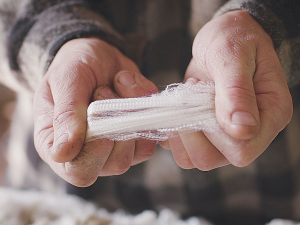Top wool advocate bales out
The conversion of productive farmland into trees has pretty much annihilated the wool industry.
 Merino outdoor brand, Devold, recently donated 500 merino blankets to the trust and, as Devold New Zealand general manager Craig Smith says the support was an obvious fit.
Merino outdoor brand, Devold, recently donated 500 merino blankets to the trust and, as Devold New Zealand general manager Craig Smith says the support was an obvious fit.
Wool could be the secret to keeping premature babies safe and warm, says Little Miracles Trust chief executive Rachel Friend.
The Little Miracles Trust is a not-for profit which provides support for families who are going through a neonatal intensive care experience with their babies.
“Natural fibres are best, in particular wool and in particular merino wool, to keep them warm when they have so little fat,” she says.
Merino outdoor brand, Devold, recently donated 500 merino blankets to the trust and, as Devold New Zealand general manager Craig Smith says the support was an obvious fit.
“Premature babies need to be looked after, and wool is the product to do that,” says Smith. “It’s nature helping nature. It really is the best material for the job.”
He says the partnership was a natural fit for Devold.
“It’s something pretty special that we can do, providing blankets from our own mill in Lithuania and made with fine merino from New Zealand,” he says. “We’re proud to clothe athletes at the top end and little premature babies when they come into the world.”
Friend says the donation has the potential to be a game-changer for babies and their families, both to give the little ones access to the best materials early on in life, as well as to promote merino over fabrics like polar fleece, which can be harmful.
“For these tiny babies, part of their journey in hospital is putting on fat and gaining the ability to regulate their body temperatures,” Friend explains.
“Merino is a natural fibre, so it lets their skin breathe unlike polar fleece, and they won’t overheat and risk a chill,” she says. “That’s why it works year-round as well.”
She says that 10% of Kiwi families will go through an experience with intensive neonatal care at some point.
She came across Devold at a merino wool conference, and with winter coming, reached out to Smith.
“We’re pretty desperate for it,” she says. “Actually trying to get the merino cloth itself is really difficult and can be quite cost prohibitive as well. They’ve been able to deliver the goods which I’m so excited about.”
“I just want to say a huge thanks to Devold for stepping up and being there,” Friend says. “For them to be doing this makes a massive difference. It’s the most vulnerable babies in our country who will benefit, and a huge proportion of the families who will go through this experience are from low socioeconomic areas and this will benefit them hugely, too.”
Voting has started for the renewal of DairyNZ's milksolids levy.
The most successful catchment groups in NZ are those that have 'a source to sea' approach.
Associate Agriculture Minister and Manawatu dairy farmer Andrew Hoggard says the free trade agreement (FTA) negotiated with India is not a bad deal and his party, Act, will support it when it goes before Parliament.
Newly released data from Environment Canterbury (ECan) Farm Environment Plan (FEP) audits are showing a dramatic lift in environmental performance across the region.
A solid recovery of global dairy prices this year makes a $9.50/kgMS milk price almost a shoo-in for this season.
As New Zealand marks the United Nations’ International Year of the Woman Farmer 2026 (IYWF 2026), industry leaders are challenging the misconception that women only support farming.

OPINION: Here w go: the election date is set for November 7 and the politicians are out of the gate…
OPINION: ECan data was released a few days ago showing Canterbury farmers have made “giant strides on environmental performance”.